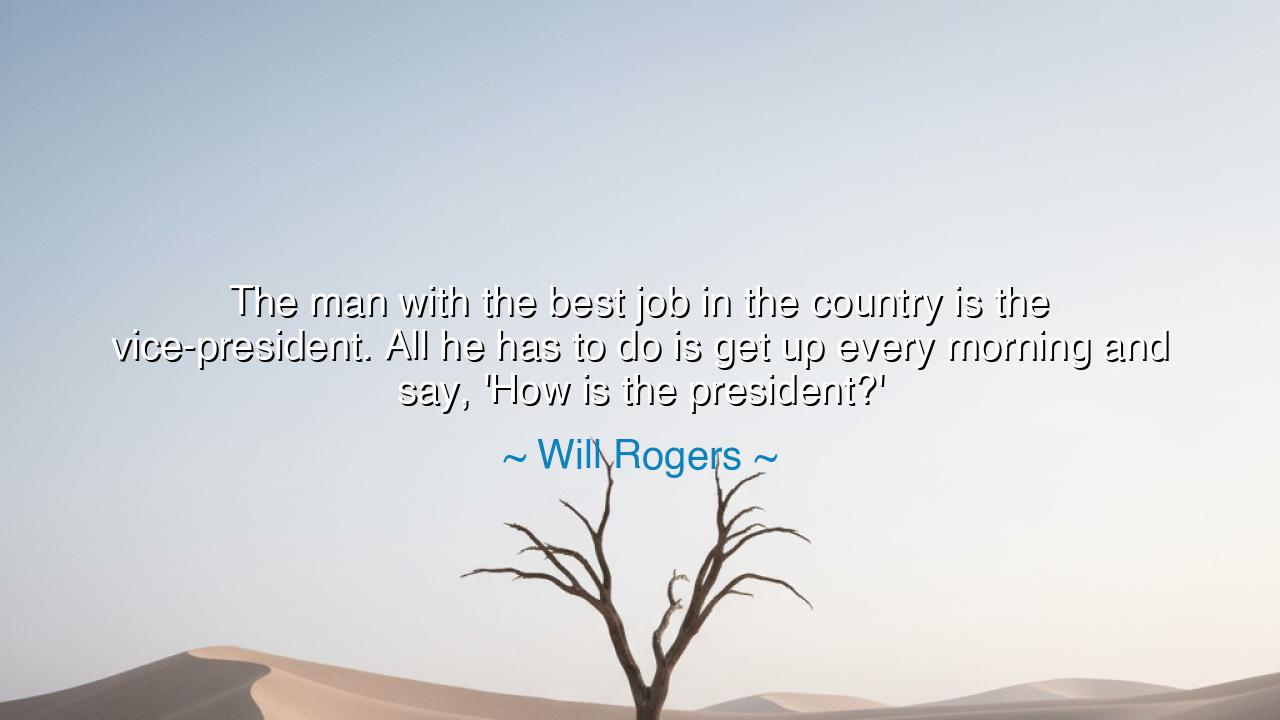
The man with the best job in the country is the vice-president.
The man with the best job in the country is the vice-president. All he has to do is get up every morning and say, 'How is the president?'






Hear the sharp humor of Will Rogers, the cowboy philosopher of America, who said: “The man with the best job in the country is the vice-president. All he has to do is get up every morning and say, ‘How is the president?’” At first glance, it is comedy, a jest about politics. But within it lies a truth as old as power itself—that there are roles whose glory shines bright but whose labor is light, whose title is heavy but whose duty is nearly invisible.
When Rogers calls the vice-president the man with the “best job,” he reveals the paradox of that office. The president bears the full weight of the nation—decisions of war and peace, prosperity and poverty. But the vice-president, standing one step behind, often carries little but ceremonial tasks. To awaken each morning with the chief responsibility of checking on another man’s health is, in Rogers’ humor, both absurd and revealing. It exposes how some positions in life offer honor without burden, recognition without responsibility.
Yet beneath the laughter lies a deeper reflection on hierarchy and dependence. The vice-president’s role is defined not by his own will, but by the condition of the president. His power sleeps until tragedy awakens it. Rogers’ joke points to the strange fragility of the office: exalted in name, yet empty in practice until fortune intervenes. It is a reminder that titles do not always match the weight of true responsibility.
History illustrates this vividly. Consider John Tyler, who became president only upon the death of William Henry Harrison after just a month in office. Tyler was mocked as “His Accidency,” a man elevated not by his own striving but by circumstance. Or think of Harry Truman, a vice-president who knew little of the atomic project until Franklin Roosevelt’s death thrust him into decisions that reshaped the world. In both cases, the vice-president lived in the shadow until the moment fate called them forward. Rogers’ jest rests upon this truth: the position is one of waiting, of watching, of living in the in-between.
The deeper wisdom of Rogers’ humor is that many in life crave titles without toil, honor without hardship. Yet the greatest rewards often belong not to those who sit second-in-command, but to those who bear the weight of true responsibility. Rogers exposes the human tendency to envy positions of apparent ease, when in truth, greatness is measured by the burdens one accepts, not the comforts one enjoys.
The lesson is clear: do not chase roles for the sake of title or proximity to power. Seek instead the labor that calls forth your strength and tests your character. If you are given a duty, fulfill it with diligence, whether great or small. And if you are placed in the shadow, prepare yourself quietly, for destiny may one day summon you into the light, as it did Truman and others.
The practical action is this: each morning, do not ask merely, “How is the president?”—that is, how fares the one above you. Instead, ask, “What is my duty? How can I serve faithfully where I stand?” For the worth of a person is not in the grandeur of their title but in the sincerity of their labor. In this way, even if the world sees you as second, you may live with the dignity of one who has truly led.
Thus, Rogers’ playful words endure not merely as humor, but as wisdom veiled in jest. They remind us to laugh at the vanity of titles, to see through the hollowness of empty honors, and to measure life not by proximity to power but by the honesty of one’s daily work.






AAdministratorAdministrator
Welcome, honored guests. Please leave a comment, we will respond soon